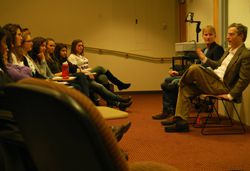
Members of Boston University’s Amnesty International chapter examined the treatment of the imprisoned Pfc. Bradley Manning on Wednesday in the College of General Studies, questioning whether his treatment in maximum-security federal prison is a violation of human rights.
Detained in Virginia, Manning has been accused of leaking classified documents to non-profit media organization WikiLeaks after serving in Iraq.
“Our primary goal is to raise awareness about the inhumane treatment inflicted on Pfc. Manning as he is being held pre-trial at Quantico Marine Base in Virginia,” said College of Arts and Sciences sophomore Kristen Martin, the vice president of BU’s chapter of Amnesty International.
“Currently, [Manning] is being held in solitary confinement under a Prevention of Injury Order,” Martin said. “He is also forced to strip nude at night and remain without his clothing until the morning.”
Martin said the BU chapter of Amnesty International followed suit of its national parent organization.
“The larger Amnesty International organization has spoken out against the treatment of Pfc. Manning, calling it ‘unnecessarily harsh and punitive,” Martin said.
David House, CAS alumnus ’10 and the founder of BU Information Lab and Design Space, said when he visited Manning in prison, he noticed the conditions were deplorable.
“He is held by a leather belt and chains shackled together,” House said. “He’s 5 feet, 3 inches and weighs under 110 pounds, and is escorted by large marines.”
House said visiting Manning was a transformative experience and led him to become a public advocate against human rights abuses.
“Watching him deteriorate, having my phone tapped, my computer seized, all changed my perspective of how the government treats activists,” House said. “Bradley Manning is a U.S. citizen and what’s happening to him is disturbing for me. So much pressure on the diminutive figure, which is interfering with his right to a fair trial.”
Dr. Stephen Soldz, the founder of Psychoanalysts for Peace and Justice, spoke about the psychological aspect of the torture Manning is experiencing.
Solitary confinement is “worse than physical torture,” Soldz said. “Sen. John McCain said that it crushes your spirit.”
Solitary confinement interferes with ability to cooperate in trial, making the accused unable to consider facts or exculpatory evidence, Soldz said.
Many audience members said they felt that Manning’s case was a violation of human rights, though they expressed mixed feelings about his involvement with WikiLeaks.
“I think [Manning] did something wrong because he did not keep secrets even though he served in the military, but he should not be abused,” said Kimi Ye, a student in BU’s Center for English Language and Orientation Programs.
Some attendees said they wanted to help and were interested in signing a letter addressed to President Barack Obama.
“I’m glad to see something like this although it’s a little late,” said Abram Trosky, a senior graduate student in CAS. “Better late than never. I’m personally for WikiLeaks and the exoneration of Bradley Manning. It’s good that Amnesty International has a practical initiative with the letters, rather than it just being academic.”